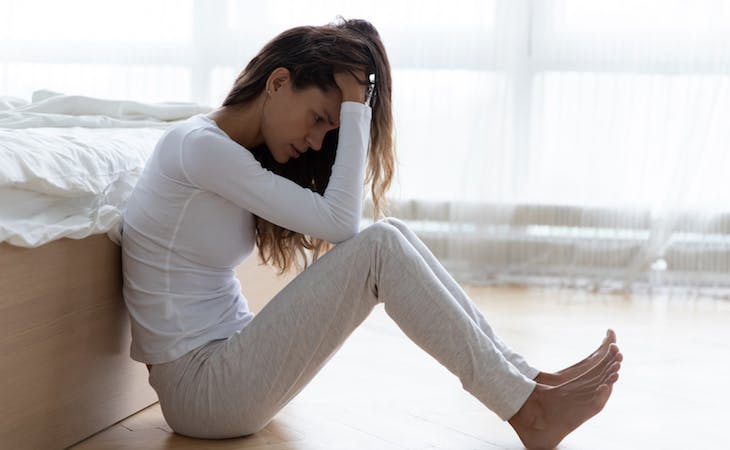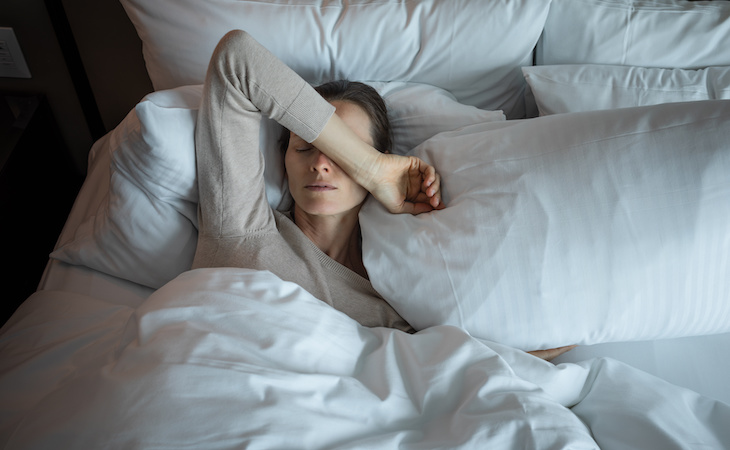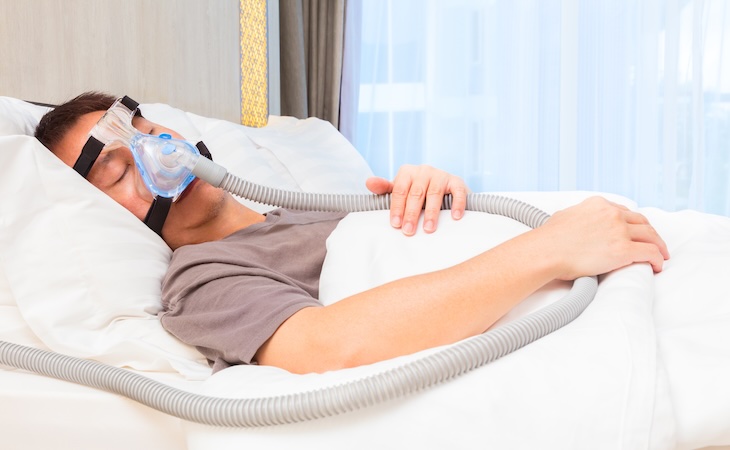If you’ve ever woken up to a racing heart, sweating, or feeling like someone is choking you, you may be having panic attacks while sleeping. Rest assured, “nocturnal panic attacks are terrifying but very treatable,” says licensed clinical psychologist John Paul Garrison, PsyD. Here’s what you need to know so you can get the care and rest you need.
What are nocturnal panic attacks?
Nocturnal panic attacks are pretty much what they sound like. “These are panic attacks that wake sufferers out of sleep in a state of extreme anxiety,” Garrison explains. They most often occur during the end of the second and beginning of the third stage of sleep. While these panic attacks are alarming, they’re not dangerous and usually last only a few minutes. However, once you’re awakened by one you may find it harder to fall back asleep.
If you think you’re waking up with panic attacks, start by seeing your doctor, who can rule out other potentially harmful conditions. “Often people worry that their symptoms are related to a physical problem rather than a mental one,” Garrison says. “Having a physical or a check-up ensures that the panic attacks are not another issue, and that gives you evidence that it is purely psychological.”
Once you know your symptoms are not caused by something physical, find a mental health provider, who can help diagnose your problem and develop a treatment plan. “Due to the complex nature of panic and anxiety, it is often advisable to speak to a psychologist,” Garrison says.
Panic attack vs anxiety attack
Some people use the term “anxiety attack” to describe intense periods of anxiety, says Monique Reynolds, PhD, licensed clinical psychologist at the Center for Anxiety & Behavioral Change in Rockville, Md. However, most doctors don’t use the term because, unlike “panic attack,” there’s no clinical definition of “anxiety attack.” Additionally, panic attacks in sleep are different from sleep terrors, nightmares, and arousal caused by dreams.
Symptoms of panic attacks
“Nocturnal panic attacks generally comprise the same symptoms of panic attacks that occur while aware and awake,” says licensed clinical psychologist Benson Munyan, PhD, director of Neurocove Behavioral Health in Orlando, Fla. This includes physical symptoms such as:
- sweating
- rapid heart rate
- trembling
- shortness of breath
- heavy breathing
- flushing
- chills
- nausea
- tingling
- feeling like you are choking
But this scary experience isn’t only physical. It can also cause mental and emotional symptoms such as:
- disorientation
- sense of dread or intense fear
- fear of losing control or dying
Causes of panic attacks while sleeping
“There’s no obvious cause for why some people experience panic attacks,” Munyan says. “They are often un-cued or occur without prompting or without obvious triggers, such as nightmares or loud noises.”
Research suggests that genetics, stress, or underlying conditions such as a sleep disorder or thyroid problem might contribute to panic attacks, Munyan adds.
Additionally, those who experience panic attacks while sleeping also tend to have panic attacks when they’re awake.
Between 44% and 71% of people with panic disorder have had at least one nighttime attack. Lastly, research links adult sleep panic with early childhood sleep terrors.
Handling panic attacks at night
If you suffer from nocturnal panic attacks, various treatments may help in the moment. Consider these techniques and see what works for you.
Take deep breaths
Doing so will increase activation of the parasympathetic nervous system. “If practiced correctly, this will help suppress the sympathetic nervous system, which is responsible for the physiological effects of panic and anxiety,” Munyan explains.
You can try counting as you slowly inhale and exhale, working to increase your count each breath, or practice diaphragmatic breathing. Place one hand on your chest and the other on your belly. As you inhale, feel your stomach expand and press into the lower hand while your chest remains fairly stable. As you exhale, feel your stomach move back down as your chest again stays fairly still. (Here are more deep breathing exercises to help you sleep.)
Try progressive muscle relaxation (PMR)
This practice also increases the activity of the “rest and digest” parasympathetic nervous system. Starting at your toes and working to your head (or going from your head to your toes), tense and then release each muscle group one at a time. Since our muscles are often tense due to panic or anxiety, releasing the tension may also help release feelings of distress.
Don’t fight the panic attack
Trying to force yourself out of a panic attack in sleep may only make things worse.
Go back to bed when you feel tired again
Falling back to sleep is often hard no matter what aroused you. It’s better to wait until you truly feel tired to go back to bed. Consider getting out of bed and doing some light reading or gentle stretching until your head starts to nod.
Take prevention measures
A few lifestyle changes may help prevent a panic attack while sleeping. If you drink coffee and other sources of caffeine, “reducing intake after 2 pm can help reduce anxiety during the evening by reducing general arousal,” Munyan explains.
Also examine your nighttime routine. “Allowing the brain to wind down before going to sleep will aid in better sleep,” says Amanda Levison, licensed mental health counselor from Neurofeedback and Counseling Center in Harrisburg, Pa. Also try going to bed and waking up at the same time each day. A calming nightly practice such as PMR or meditation may further help ease you into a restful state.
Lastly, consider cognitive behavioral therapy (CBT). In this type of talk therapy, you learn to challenge and change untrue and unhelpful thoughts and behaviors. Research suggests CBT may lower arousal in those with nocturnal panic attacks and reduce panic symptoms. Know that whatever method you choose, there’s help out there for treating nocturnal panic attacks.
FAQs
How do you stop panic attacks in the night?
To stop nocturnal panic attacks, try deep breathing exercises or progressive muscle relaxation to calm your nervous system. Avoid fighting the panic; instead, allow it to pass naturally. To prevent nocturnal panic attacks, try reducing caffeine intake, creating a calming nighttime routine, and considering cognitive behavioral therapy to address underlying anxiety.
Why do I have panic attacks at night for no reason?
Panic attacks can occur without obvious triggers, often due to factors like genetics, stress, or underlying conditions such as sleep disorders or thyroid problems. They can happen spontaneously, with no clear cause, and may be related to a predisposition for panic attacks during waking hours or early childhood experiences like sleep terrors.
How do you get back to sleep after having a nocturnal panic attack?
To get back to sleep after a nocturnal panic attack, wait until you feel tired again instead of forcing sleep. Try deep breathing or progressive muscle relaxation to calm your body. If you’re still awake, consider getting out of bed for light reading or gentle stretching until you feel ready to sleep again.
Next, learn about the connection between PTSD and sleep, including tips for sleeping better with PTSD.




